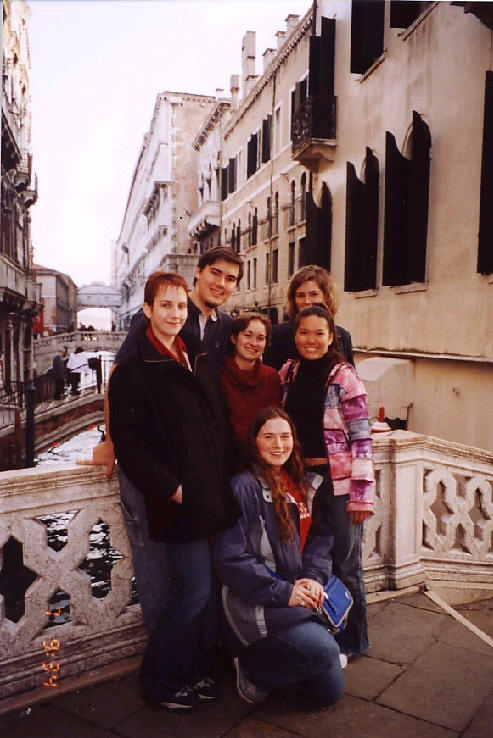|

|
A Student Teaching Experience
By Shannon Kloser
For student teaching, a
student is paired up with a veteran teacher who becomes a mentor for
the student. For the first week or two, the student teacher
observes the manner of the teacher and starts to plan on taking over
a class or two in the following weeks. The process Monmouth College
likes to use is called gradualism. This is when a student
teacher takes a class from the veteran teacher one by one until the
student teacher has all the classes under his/her control. Then the
student teacher plans, teaches, and grades everything for four weeks
straight. This is to help the student teacher realize what it
should feel like to teach for an extended amount of time. During
the gradualism period and the full four weeks of teaching, the
student is observed. This means the student is watched while
teaching at least five times by a faculty member from the college.
I was fortunate and I have my school’s principal as my supervisor.
The visits, I must admit, are nerve racking because you want to do
well but the college supervisor understands this fact.
Besides
being in the classroom everyday for eight hours, a student teacher
must attend a one hour class on Monday nights that correlates with
the experience of student teaching. This is where many student
teachers share stories, gather ideas on how to handle certain
situations, and ask for opinions from Monmouth College education
professors. We also are required to write a ten page paper
discussing our experience and put together an educational portfolio
that will help us transition to a teaching certificate once we have
graduated. There is a lot to do but it is worth the experience.
This semester I
have become a full fledged teacher for around ninety-five students
at Central Junior High School. I am teaching language arts to
seventh graders. I have been fortunate to have a wonderful
experience and an even better staff to work with. From the first
day, all the student teachers at Central were welcomed with open
arms from all teachers and the principal as well. They have
included us not only in the classroom but also have invited us to
social gatherings at different teachers’ homes.
During student teaching, I had
a rude awakening of how much teachers really do accomplish in their
daily lives. I know this sounds corny, but it is amazing how much
teachers do inside and outside of the classroom. Most of the
teachers have families and children. This means sports practices,
dance practices, helping with homework, cooking dinner, and getting
the laundry done are all things that have to be scheduled in just to
have a normal, outside of school life. However, this does not take
into account the endless hours of grading, lesson planning, and the
several committees each teacher always seems to find time to
participate on. They combine both of those and I wonder how
teachers fit in time to sleep. I know that when I took over my full
time teaching I was working over sixty hour work weeks and its a lot
of work.
I have had a wonderful
experience and I am fortunate to have such a welcoming school. I
have learned to be creative in the classroom with regards to not
only dealing with lessons and material to be covered, but also in
dealing with discipline situations. I never did think that I would
have the strength to discipline and to become a teacher, feeling
that I was not old enough to handle a classroom on my own. However,
I now feel more confident about how I handle myself in the classroom
and that becoming a teacher is something that I definitely want to
pursue. Teaching has taught me my strengths and shown my weaknesses
as well, but that is all in part of learning how to become a good
teacher. To all those who may be student teaching in the future—I
wish you good luck and enjoy your experience.
|
|
Overseas Study
By Carrie Casper

This past spring I had the opportunity to participate in
the Associated Colleges of the Midwest London Florence Program.
This program consists of spending half the semester in Florence and
half in London studying art, architecture, theatre and literature.
The Roman Coliseum

The Florence half of the program allows students to
study the Italian language, art history and literature. When
students arrive in London they study architecture and theatre within
the city.

The Venice Trip |
Going overseas is an amazing opportunity for any student.
As an English student one of the aspects that I found most
intriguing was all the side trips and site seeing I was able to
do. During the time I was there I was able to visit Rome
and Athens and Venice and Dublin and many other cities that are
often the backdrop of famous pieces of literature. To live
in Florence and be reading
Room with a View at the same time was enlightening. I was
walking the very streets that the characters were walking. This
opens an entirely new meaning to the pieces that I read in classes.
I can identify and visualize as I never have before. |
|
Going overseas is the best
experience a student can have during college. Through school is the
easiest way to experience other countries while taking classes.
Short overseas trips that students can apply for this year include
Reading in Reading (speak to your advisor ) or the Spring Break trip
to Pompeii (contact Tom Sienkewicz for this and all other overseas
programs). I highly encourage all students to look into going
overseas, even if it is for only Spring Break. The experience will
change your life. |
|
|
Death’s Whispers
By Jacob Donley
Death, why do you come so
soon?
Why does your lyre sing for me?
The songs of a sad, sad tune? What use do you have of me?
What fires spit a blaze better?
Without my eyes fixed upon them?
Do I have time to write a short letter?
Long and short strokes of a quill pen Make these few minutes or days Worth more than the weeks or years
That drove you to find me in this haze
Of lasting cries and long dried tears.
Death, why do you come so
quickly?
The fear that is left deep inside
Leaves me feeble and sickly Unable to carry on in time.
Why must you make those who feel for me Cry and spit at you while it's me they miss?
Those tears that drench the ground for me
Are the only memories I enjoy in bliss. Why do you take me away? Why do I hear the crying in the night? I won't go with you, I will stay, Even if I must put up a fight. I will fight to the death Just to keep away from death's whispers.
|
|
The Shenandoah Shakespeare
Express
By Jessica Heinen
On October 6-7th the Monmouth College hosted
the highly acclaimed Shenandoah Shakespeare Express, the traveling
theater group from Staunton, Va. who brought a fresh new look on
William’s old plays.
The group put on two workshops, one entitled “Who’s Your
Daddy?” and the second “Shakespeare’s Staging Conditions and Theatre
of the Imagination” was demonstrated after their amazing performance
of Henry IV on October 6th.
“I thought it rocked,” commented junior theater major
Emily Mitsdarffer. “It was very exciting, very different. The
performance of Henry IV was very innovative yet they managed
to stick to the classic-feeling of the play.”
There are two groups of actors associated with
Shenandoah Shakespeare, one which travels across the country for two
and a half months at a time and the other a resident group in
Staunton which performs at the 300-seat Blackfriars Playhouse, the
world’s only reconstruction of Shakespeare’s indoor theater.
“We’re all professional actors from all over the
country,” said Dennis Henry, troupe manager for the Excellent Motion
Tour. “A couple of us are from California and New England.”
Shenandoah Shakespeare has toured through 47 US states,
and five foreign countries since its 1988 inception by its creators
Jim Warren and Joyce Peifer. The particular troupe who came to
Monmouth travels from Maine to Florida and South Dakota to Texas
during the fall and in between goes home to Staunton at Christmas.
|
|
Untapped
Resources
By Mathew
Underwood
Residing below the somewhat innocuous and formal title of "English
Major," there are numerous intellectual pursuits which are both
accessible and engaging to English majors here at Monmouth.
These pursuits often times go ignored during an English student's
academic career, so hopefully this article will entice some Majors
to become more aware of what it means to study literature.
The Hewes Library contains all sorts of resources that are
peripheral to actual material covered in English courses, such as
books and critical articles on philosophy and history which all
English students will have to utilize at some point during their
tenure here at Monmouth. Another of these peripheral resources
are the literature journals which the Library has subscribed to.
For most Majors, these journals are seldom used if ever during their
entire academic career. This is a rather unfortunate
situation. These journals contain studies which treat a
massive range of issues in the contemporary study of literature.
From Latin American Literature to Feminist theory to the theory on
how to teach English in an educational context, there is an
intellectual morsel that should appeal to just about everyone's
palate.
There are in fact eleven different journals in the library which
treat topics in the study of literature exclusively. Some
journals are subject specific, such as Legacy, which treats
topics concerning American women writers only. Other journals
attempt to cover a broader range of issues that are pertinent to the
study of literature. The journal Critical Inquiry
publishes articles on both Deconstruction and Shakespeare in a
single issue. These journals could become an invaluable tool
to help English Majors become more aware of the piquant and mulit-faceted
study of literature.
|


|
What is
problematic about professors utilizing their own published works as
course material? Is there anything problematic about it at all? |
| |
|
|
Most of
the time, when professors try to utilize their own material in a
course, the class becomes victims of the instructor's vanity and the
novel or short story is usually not worth reading. However, if the
professor was an author such as John Irving or Kurt Vonnegut, the
above statement does not apply. If the work is worth reading, I see
no problem with having an instructor teach his or her novel. |
| Brandon
Athey |
|
|
Professors present their own
theories and ideas whether or not the ideas have been published or
are even written down. Especially if there are not textbooks
available that address the topic or meet the students' or
professor's needs, this seems appropriate. The true question, it
seems to me, is the financial one: should a professor make money by
requiring his or her own book in a class that s/he is teaching? I
would have to say yes, although it could certainly get out of
control. As an undergraduate, I had a theater professor who
required his book of all students in his auditorium courses--and
students could not buy a used copy because he required that we use
the forms in the text for exams. He would not accept photocopies.
Students always grumbled but it
was
an excellent text (I still have mine) and actually, it was much
cheaper than most textbooks. I would not, however, feel comfortable
following his example. I would have no qualms about requiring
students to read an essay that I had published, however. |
| Dr.
Belschner |
|
|
This is
problematic because 1.) the professor will be partial to this book
and possess certain opinions that may be rather biased due to the
nature and content of the book
2.)
The
inclusion of a professor’s book as course material will prove to
narrow the professor’s view on the topic and subject; as opposed to
using outside course material
3.) The
class might be inhibited in a critique of the book and its
contents. A professor will have a hard time stepping back from his
or her work to accept criticism. |
| Faith Bode |
|
|
It is
incredibly problematic. By putting the students in a position of
having to deal with and assess their professor's work on a daily
basis, the professor is in a position of completely unnatural
control over the students. It becomes impossible for them to ever
criticize or question the text in a manner that they would if it was
someone else's work. The students immediately become "yes men" and
"yes women" that must read the text like Holy Scripture for fear of
being graded unfairly because of their distaste for the professor's
work. A professor assigning their own text for a class her or
she is
teaching is simply an abomination to the academic process and an
insult to the students' abilities and intelligences which must be
compromised when dealing with the text. |
| Ryan
Schrodt |
|

|
|
| Writing Labs |
3:00-5:00 pm Monday -
Thursday |
| |
7:00-10:00 pm Sunday -
Thursday |
|

|



